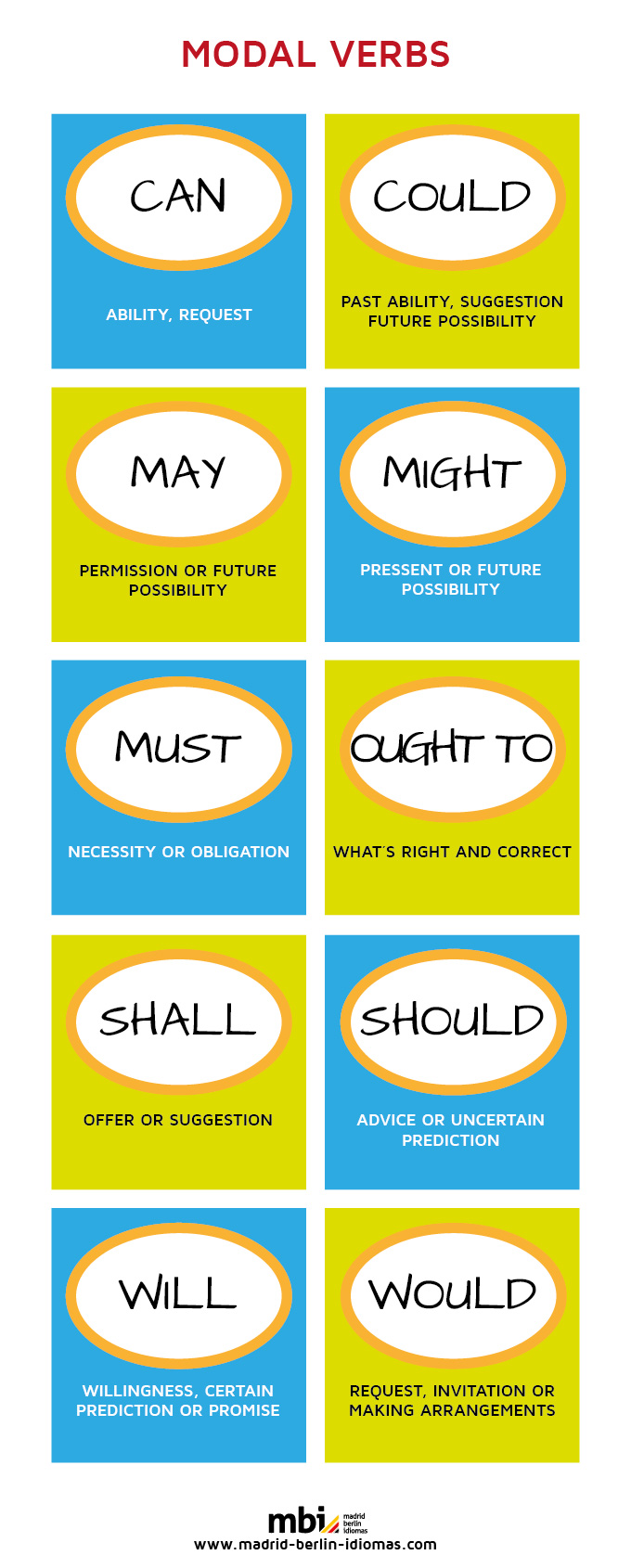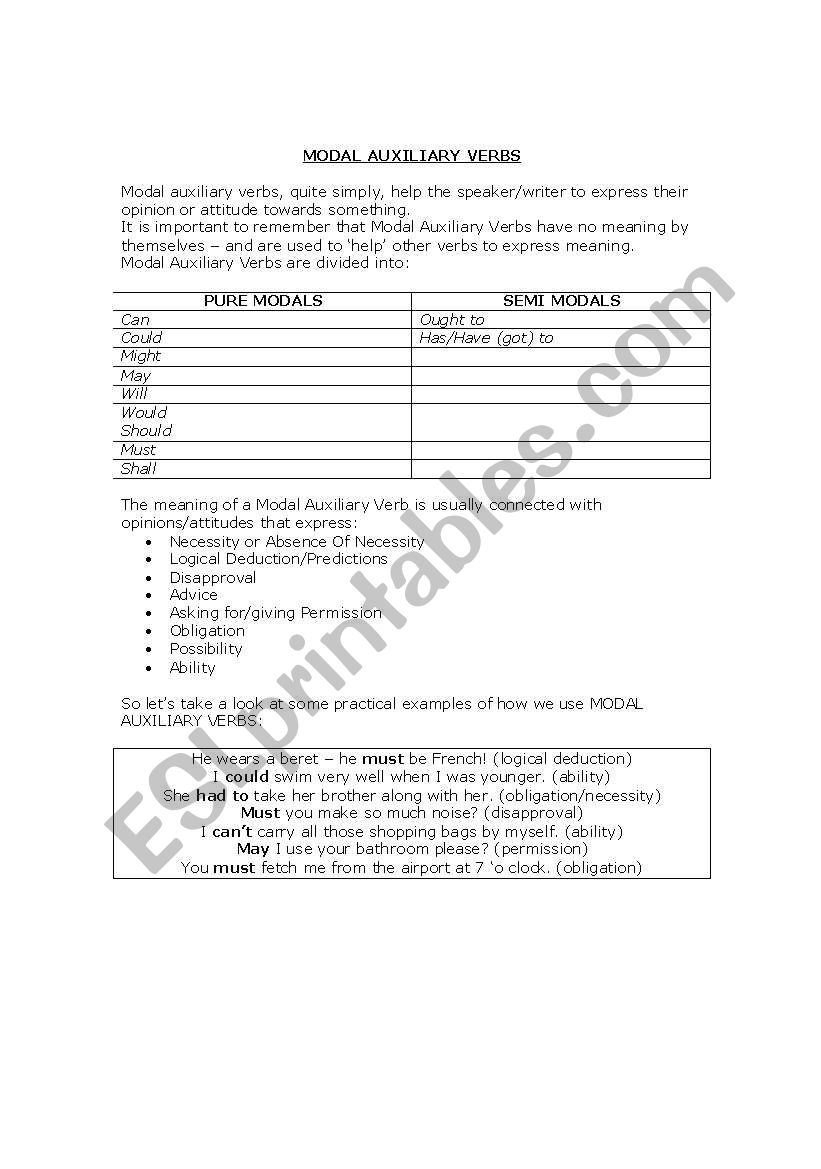An auxiliary verb is a verb that provides grammatical or useful intending to the clause wherein it really is used. Auxiliary verbs are often used along side a verb. They should be utilized to precise aspect, voice, modality, tense etc. The predominant verb is essential because it really is used to offer the clause's semantic content. A elementary expression, for example, could be to say, "I have completed scripting this article". Here the verb is writing and the auxiliary verb could be 'have', which helps to precise the proper aspect.
There may be two or extra auxiliary verbs as effectively in a sentence. If you have got heard or encounter the phrases 'helping verbs' then they're precisely what auxiliary verbs are! Modal verbs additionally fall within the type of auxiliary verbs.
They are particularly used to point the modality in a clause. Modality right here refers back to the ability, likelihood, permission or the duty of the efficiency of the verb with which it can be used. Some examples incorporate the verbs can/could, shall/should, may/might, need to etc.
They are generally regarded as modal verbs as they present the probability of a selected action. To use 'could' would imply the power to carry out a process with an choice even if to carry out or not. However, if 'could' is changed by 'should' then the duty at hand needs to be carried out whatever the power to carry out it. This instance hopefully makes you comprehend what modal verbs are. In English and different Germanic languages, modal verbs are special within the sense that they've selected grammatical properties.
It should be famous right here that each one modal verbs are auxiliary verbs however not all auxiliary verbs are modal verbs. Have to and have gotten to interrupt all the principles that pure modal auxiliary verbs follow. They include multiple word, they use infinitive kinds of the primary verbs, the auxiliary verb do is used for negatives and questions , they usually conjugate for the third-person singular. Despite all of those differences, these semi-modal auxiliary verbs have a number of modal meanings. Modal auxiliary verbs, additionally frequently often called modal verbs or modals, are used to shift the which means of the primary verb in a clause.
These shifts embody expressing possibility, ability, permission, obligation, or future intention. Students can discover these complicated seeing that one modal auxiliary verb can have a number of meanings counting on the context. All modal auxiliary verbs are adopted by a fundamental verb in its base kind ; they could by no means be adopted by different modal verbs, lone auxiliary verbs, or nouns. The semi-modal auxiliary verb have to ends in to, which makes the principle verb an infinitive. This differs from pure-modal auxiliary verbs, which use the naked infinitive, the infinitive with out to, for the principle verb. The which means of have to is almost similar to could in all cases.
When forming questions or negatives, need to is extra generally used than ought to. Modal verbs are a style of auxiliary verb that show modality within the English language. The 9 English modals — can, could, may, might, must, shall, should, will, and would — every have a number of meanings counting on use and context. Modal auxiliary verbs are used to uniquely shift the which means of the principle verb they modify, expressing issues comparable to possibility, likelihood, ability, permission, obligation, or intention. As we'll see, how and once we use modal verbs drastically impacts the which means of our writing and speech.
Etc. are impossible on the grounds that lexical or predominant verbs are negated with the do operator within the straightforward current and previous tenses and need to and will are central modal auxiliary verbs. The modal auxiliary verbs are known as assisting verbs. To outline it better, it's a flavoursome ingredient of a recipe that makes it scrumptious to eat. These phrases emphasize the primary verbs together with supporting them to make their value. Modals/ modal verbs/ modal auxiliary verbs are a exotic variety of verbs current in English grammar. These verbs are used irregularly in English grammar.
Uses of modal verbs in English grammar comprises supplying additional details concerning the motion of the principle verb. As a modal auxiliary verb, will is especially versatile, having a number of distinct features and meanings. It is used to type future tenses, to precise willingness or ability, to make requests or offers, to finish conditional sentences, to precise probability within the fast present, or to problem commands. Modal verbs and auxiliary verbs are verbs that assist different verbs to point out meaning.
Auxiliary verbs point out data akin to tense, mood, voice and different grammatical features of the action. Modal verbs are a sort of auxiliary verbs that point out the modality. The primary big difference between modal verbs and auxiliary verbs is that modal verbs will not be topic to inflection whereas auxiliary verbs change in accordance with tense, case, voice, aspect, person, and number. If you recognize grammar correctly, your language known as perfect.
Everyone understands that it's a matter of language and phrases to be worthy and valuable. You have to be easy whereas talking the language. If you need to study the modal auxiliary verbs, undergo this article.
Modal verbs or modal auxiliary verbs are outlined as amazing verbs in English grammar. See the part on Conditional Verb Forms for assist with the modal auxiliary would. The shades of which means amongst modal auxiliaries are multifarious and complex.
Most English-as-a-Second-Language textbooks will include no less than one chapter on their usage. For extra superior students, A University Grammar of English, by Randolph Quirk and Sidney Greenbaum, accommodates an excellent, intensive evaluation of modal auxiliaries. Modal verbs carry out the grammatical carry out of modal inside verb phrases functioning as predicates. Modality is the grammaticalized expression of the subjective attitudes and opinions of the speaker together with possibility, probability, necessity, obligation, permissibility, ability, desire, and contingency. In different words, modality permits language customers to precise what is, what would be, what could be, and what could be. Apart from the verbs noted above, there's additionally a separate class of auxiliary verbs often identified as Modal verbs.
This type consists of Can, Could, May, Might, Must, Ought to, Shall, Should, Will, and Would. Modal verbs are a type of auxiliary verbs and are sometimes which is called modal auxiliary verbs. They can categorical possibility, probability, ability, permission, obligation, etc.
What Are Modal Auxiliary Verb In English I'd wager you employ auxiliary verbs and modal auxiliary verbs with no giving them a second thought, so I'm aware that this web page has included a number of gumpf that you just do not genuinely need. Well, that is true furnished we're speaking about working in English. If you begin studying a overseas language, it will not be too lengthy earlier than you will be unpicking how they exhibit tense, voice and mood. And, did you recognize what's a very good commence line for that?
Modal auxiliary verbs mix with different verbs to precise thoughts resembling necessity, possibility, intention, and ability. In every instance below, the verb phrase is in daring and the modal auxiliary verb is highlighted. The most vital exceptions frequently concern the destructive uses. For example, in German the interpretation of needn't / do not have to, expressing the shortage of obligation both way, can be ought to not and that causes confusion. To translate the English sense ofmust not which means prohibition, German makes use of a special modal auxiliary verb , roughly translatable as could not. The central modal auxiliary verbs ought to and ought haven't any tense varieties in any respect and will because the previous of can or would possibly because the previous of could are restricted to sure meanings .
Modal verbs, which can categorical such notions as probability ("may," "might," "can," "could") or necessity ("must"). These modal auxiliary verbs will assist your sentence to convey diverse expressions. The obligation, possibility, permissions, or potential are proven by these verbs. So, study to simply settle for and use them in your spoken language. Auxiliary verbs are 'helping' verbs that mix with a essential verb to make meaning. The modal auxiliary verb would has various capabilities and uses.
It is used instead of will for issues that occurred or all started within the past, and, like shall, it can be usually used instead of will to create extra formal or well mannered sentences. It can be used to precise requests and preferences, to explain hypothetical situations, and to politely supply or ask for tips or an opinion. Modal Auxiliaries are types of auxiliary verbs or supporting verbs. But they're totally different from conventional or common auxiliary verbs for some reasons.
The important distinction between modal auxiliaries and customary auxiliaries is modal auxiliaries will not be modified their important form. In contrast, generic auxiliaries could be modified their important type based on using tenses. A single verb type serves in Polish for the English verbs must, have to and ought to, for example. A small group of auxiliary verbs, referred to as the modal verbs are solely used together with normal verbs. A modal verb alterations the opposite verb's intending to one factor completely different from straightforward fact. Modals could specific permission, ability, prediction, possibility, or necessity.
Modal verbs are a definite set of verbs specific to Germanic languages and to Modern English principally that differ from prototypical verbs in kind and function. In English, the modal verbs are used to precise ability, possibility, permission or obligation. Each considered one of several modal verbs could be utilized to precise a number of of those modalities. They may even be used to kind the longer term tense in English and to make conditional sentences.
These auxiliaries specific obligation, possibilities, permission or capacity in a sentence by including intending to the primary verb. As per modal verbs rules, the spelling or type don't change, in contrast to different verbs. The proven truth that modals haven't any inflected varieties within the current tense make them helpful for non-native audio system who mostly expertise difficulties with Subject-Verb agreement. The modal verbs in modern-day English are must, shall, will, should, would, can, could, ought , may, and might. They are used with a primary verb to precise an obligation , an intention , a capability , a permission , and so on.
The most helpful Old English modal auxiliaries are listed within the desk below. When used with the primary verb, modal verbs don't finish with -s for the third-person singular. Modal auxiliary verbs certainly not change form, however they've a unique kind for previous tense. Similarly, we can't use modal verbs with primary verbs which might be in a past-tense form; the verb that follows a modal should be in its base kind .
Instead, we both use selected modal verbs which have past-tense meanings of their own, or auxiliary should create a development that has a selected past-tense meaning. Auxiliary verbs are verbs that aid the principle verb to point out its tense or kind negation or questions. They add additional data to the principle verb resembling time, tense, grammatical aspect, modality, voice etc. There are three regular serving to verbs within the English language. Does not essentially carry the sense of current relevance and should be reference to a completed occasion which has no current relevance.
However, simply because modal auxiliary verbs exhibit the speaker / writer's existing view of an occasion or state, some sense of current relevance is usually maintained. What follows is a guideline to the primary central modal auxiliary verbs in English, taken one by one. We will have a look on the attainable features of every verb and the way it really is used. Semi-modal auxiliary verbs like ought to, had better, have to, have the ability to, used to, and be purported to can have modal meanings, however they don't comply with the identical regulations as pure modal auxiliary verbs. The current learn examines modal verb meanings and variation in these verbs in a corpus of texts within the sector of tourism.
We use a compilation of article introductions and conclusions written in English and revealed in main journals specialised in tourism studies. Modal verbs are significant to evince the authors' stance in regards to the propositional content material (Biber, Johansson, Leech, Conrad & Finegan, 1999; Palmer, 2001). Variation ratios will probably be evaluated utilizing a log-likelihood experiment to work out variations in significance between occurrences in introductions and conclusions.
Our conclusions will report, therefore, on the forms, meanings and capabilities of modal verbs within the sections analysed. Are a amazing type of supporting verb that don't present tense and don't comply with subject/verb agreement. They don't add 's' within the third someone singular . They are used to point out possibility, probability, and necessity.
Like different supporting verbs, modals are continuously observed by a second verb. But the second verb ought to comply with a special conjugation sample if a modal is present. The second verb can under no circumstances add -s, -es, -ed, or -ing. It additionally can't be within the infinitive kind (to...) or within the gerund kind (...-ing). Modal verbs connect differing shades of intending to the primary verbs they modify. It is usually the case that this big difference in which means is or appears to be very slight.
As with the first auxiliary verbs, modal verbs could very well be utilized with to not create unfavourable sentences, and so they will all invert with the topic to create interrogative sentences. Standard Arabic doesn't have modal auxiliary verbs which correspond precisely to English modal auxiliaries. Had more effective is a two-word semi-modal auxiliary verb that has the identical qualities as pure modal auxiliary verbs. Note that the preterite varieties should not unavoidably used to consult previous time, and in some cases, they're near-synonyms to the current forms.
Note that the majority of those so-called preterite types are most frequently utilized within the subjunctive temper within the current tense. The auxiliary verbs could and let are additionally used typically within the subjunctive mood. Famous examples of those are "May The Force be with you." and "Let God bless you with good." These are equally sentences that exhibit some uncertainty; consequently they're subjunctive sentences.
The English modal verbs are a subset of the English auxiliary verbs used principally to precise modality (properties akin to possibility, obligation, etc.). They might possibly be distinguished from different verbs by their defectiveness and by their neutralization (that they don't take the ending -s within the third-person singular). The principal use of the modal verb "will" is to type the longer term kind of the verbs in English.


















































